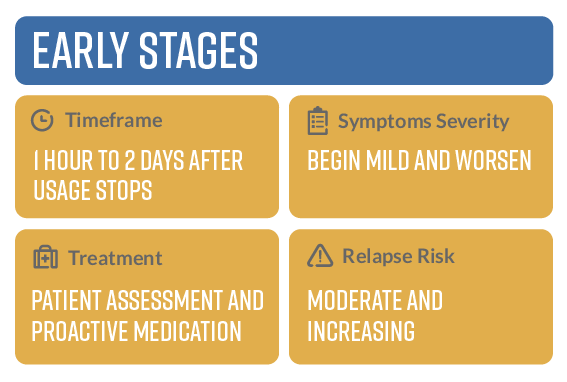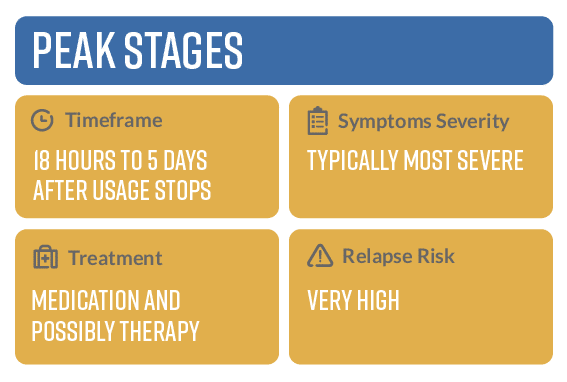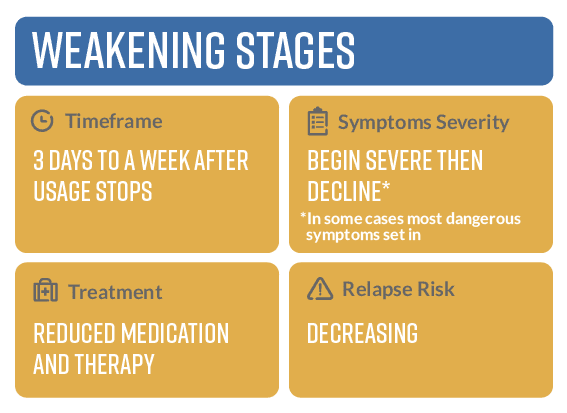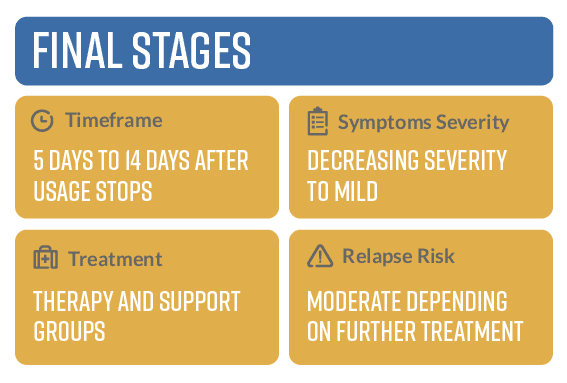Detox
The first step towards sobriety for most in recovery is detox, where the body is cleansed of the substances that are polluting it.
Substance Abuse Detox
Detox, also known as detoxification, is the first stage in the recovery process for most drug and alcohol use disorders. The detox process purges the body of addictive chemicals, allowing patients to stabilize their physical and mental health in order to transition to either an inpatient or outpatient treatment program.
During detox, the patient either stops using the substance or substances to which they’re addicted or gradually reduces their dose (known as tapering) under medical supervision. Most patients who are addicted to particularly strong substances like prescription Opioids or Benzodiazepines are weaned off the drug slowly so as to not completely shock the body.
Usually, detox of any kind is uncomfortable at best and miserable at worst; the body experiences withdrawal and painful, uncomfortable symptoms ranging from cravings to hallucinations occur. In some cases, withdrawal symptoms such as seizures and heart problems can cause death, making proper medical supervision critical. This is especially true for Alcohol, Barbiturate, Benzodiazepine, and Opioid detox. During withdrawal, medical intervention is often necessary to keep the patient safe and comfortable. Successful treatment and detox includes a combination of medication and therapy.
Paid Advertising. We may receive advertising fees if you follow links to the BetterHelp site.
Online Addiction Counseling
Get professional help from an online addiction and mental health counselor from BetterHelp.
- Personalized Matching Process
- Easy Online Scheduling
- 30,000+ Licensed Therapists
Types of Detox
While there are many variations, there are three general types of detox:
Medical Detox
A medical detox may or may not involve medications, depending on which substance or substances were used, the symptoms of withdrawal the patient is experiencing, psychological symptoms, and physical health issues. The term “medical” refers to staying in a clinical setting where symptoms and the body’s reaction to withdrawal can be closely monitored. Medical detox is most commonly done in an inpatient setting but can also be done on an outpatient basis as well.
Inpatient Detox
During inpatient detox, patients reside at a facility where they will receive constant supervision. This is considered the safest way to detox from many drugs, especially those that have severe withdrawal side effects. It is also the most likely to be successful. The patient’s medical team will choose the best course of treatment for each patient depending on the severity of the their addiction and the substances they were using.
Outpatient Detox
Outpatient detox allows patients to detox while residing at home. Outpatient sessions take up a part of the day, either in the morning, afternoon, or evening. Studies show that the highest rate of relapse is for patients who do not reside at the facility where detox is administered. It is wise to choose inpatient detox or inpatient medical detox in order to enhance the probability of long-term sobriety. However, outpatient detox can be successful for those who have minor addictions.
How Does The Detox Process Work?
The exact detox process will vary significantly between patients. Factors that influence detox include:
- Which substances the patient is addicted to
- How long the patient has been addicted
- The severity of the addiction
- Underlying mental health conditions
- Any additional medical problems
- Drug allergies
- Local laws
- Facility-specific policies and procedures
- Patient age
- The amount of support the patient has
- Motivation level
Despite these differences, there are some broad similarities. A typical detox process will follow these general stages:
Early Stages

During the first few hours, symptoms tend to be mild. However, they quickly worsen as the amount of drugs in the body decreases. Within a day or two, they usually will reach peak levels. Medication is not generally required at this point, although it may be prescribed proactively. Initial patient assessments are often conducted at this point.
Peak Stages

The first few days of detox are generally the worst. This is when symptoms are at their peak and therefore most severe. By this point, all or most of the drugs have left the patient’s body, leaving it unable to function properly. The symptoms that occur at this point are mostly the result of the body struggling to cope with the loss of the drugs. For many, relapse is common within this stage, as many patients find it difficult to cope with the cravings. Medication use is most prevalent at this stage, as it helps to greatly decrease the withdrawal symptoms one may feel during this time. By decreasing withdrawal symptoms, patients are less likely to relapse. Some facilities begin therapy and other forms of treatment at this stage, depending on the patient’s condition and ability.
Weakening Stages

As the body slowly becomes accustomed to the lack of drugs in its system, withdrawal symptoms generally decrease or weaken. This generally occurs within a few days to a week after detox begins. For some addictions, especially alcohol and Benzodiazepines, this is often the most dangerous part of detox, because it is when some of the most severe symptoms set in.
With other addictions, relapse may be less common during this stage because individuals have already been through the worst part. Many patients begin to see improvement in their condition during this stage. Treatment centers will begin to taper off medications and begin therapy at this time.
Final Stages

For most patients, detox will end after 5 to 14 days. By this point, symptoms have decreased and the patient may feel capable of leaving the detox facility. Treatment providers my suggest outpatient or inpatient rehab, depending on a variety of factors. Some patients may experience post-acute-withdrawal syndrome (PAWS), whereby certain symptoms of withdrawal persist, usually in a weakened form, for up to a year. Detox medication is usually ceased at this time, and patients begin to become much more heavily involved in such treatments as therapy and 12-step groups as their mind and body begin to heal.
Need Addiction Support?
Help is available. Enter your phone number to receive a call from a treatment provider.
Why Can’t I Detox On My Own?
There are four primary reasons why unsupervised detox is extremely inadvisable. It is dangerous, uncomfortable, less likely to be successful, and it reduces the likelihood that the patient will try detox again.
It’s Dangerous
There is real danger associated with detox. Some symptoms, such as hallucinations, will cause the patient to act in unpredictable and dangerous ways, potentially resulting in injury. Others, such as seizures associated with delirium tremens, can cause death. Medical supervision keeps the patient safe, monitoring their vitals and symptoms at all times. This can also help to reduce the anxiety and panic that patients feel at the beginning of withdrawal. If they know that their vitals are being watched closely, they may feel more safe and less worried about potential complications.
It’s Uncomfortable
Detox can be an intensely painful and unpleasant process. Medical supervision and intervention, such as the use of certain medications or specially designed equipment, can make these negative consequences much less severe. Most patients find that the increased comfort associated with supervised detox makes a tremendous difference, both in their ability to get through withdrawal and in their mental state once they begin other treatments.
It’s Less Likely To Be Successful
Patients are significantly more likely to complete a supervised detox than an unsupervised detox. There are a number of reasons for this, including increased comfort, better safety, having a support system, the love and connection provided by medical providers, and increased motivation. Once a patient gets through detox, their eventual likelihood of obtaining sobriety often goes up dramatically.
There Is A Higher Chance For Relapse
Those who have experienced withdrawal often state that it is one of the most difficult things they have ever endured. This is especially true of unsupervised withdrawal. Patients who have previously tried to detox themselves without medical supervision often simply cannot handle it and relapse almost immediately. However, they remember the pain that they experienced, without gaining any reward other than feelings of failure, and therefore are less likely to make an attempt to get sober again out of fear.
Detox Treatments
There are many treatments available, both medicinal and therapeutic, to help patients get through detox. Some of the most common treatment options include:
- Medication-assisted therapy
- Psychotherapy
- Meditation
- Spiritual and faith-based therapy
- Constant medical supervision
- Benzodiazepines
- Acamprosate
- Disfulfiram
- Clonidine
- Naloxone
- Suboxone®
- Methadone
How Effective Is Detox?
It’s hard to measure the effectiveness of the detox process, mostly because there are so many variables to consider. One way to track the efficacy of medically-supervised detox might be to take a look at the relapse rates of individuals who undergo the process. However, some experts have opposed this way of thinking; 1 body of experts assembled by the Substance Abuse and Mental Health Services Administration’s Center for Substance Abuse Treatment Office of Managed Care, for example, declared that “a detoxification program is not designed to resolve the long-standing psychological, social, and behavioral problems associated with alcohol and drug abuse.” Relapse, then, which does not indicate a failure of treatment in any event, may not be a viable way to measure the efficacy of detox.
Instead, it may be more helpful to look at why some types of people relapse at lower rates than others. Some studies indicate that users with a longer history of substance abuse, or those with a family history of substance abuse, may be more prone to relapse after detox. On the other hand, those who participate in motivational interviewing — a treatment modality where an individual’s motives for quitting use of drugs or alcohol are parced out through questioning — may be less likely to relapse. Overall, detox in a medically-supervised environment is likely going to be safer and contribute to a lower probability of relapse than detox attempted at home.
Do You Or A Family Member Need Detox?
Alcoholism and drug addiction can have truly devastating consequences for addicts and their loved ones. The suffering caused by withdrawal symptoms can also be quite devastating, to the point where it is a major deterrent for those who realize that they need to find sobriety. However, medically supervised detox can greatly reduce the severity of withdrawal and make it a much more endurable experience. More importantly, detox is a necessary step in your transformation from a life of addiction to a life of purpose and passion.
If you or someone you know needs detox in order to begin the journey to sobriety, contact a treatment provider today.
Start Your Recovery Today
Help is available. Explore your recovery options and break free from addiction.
